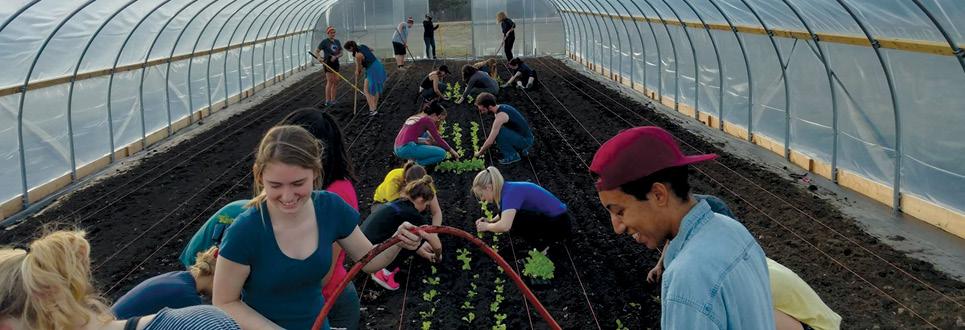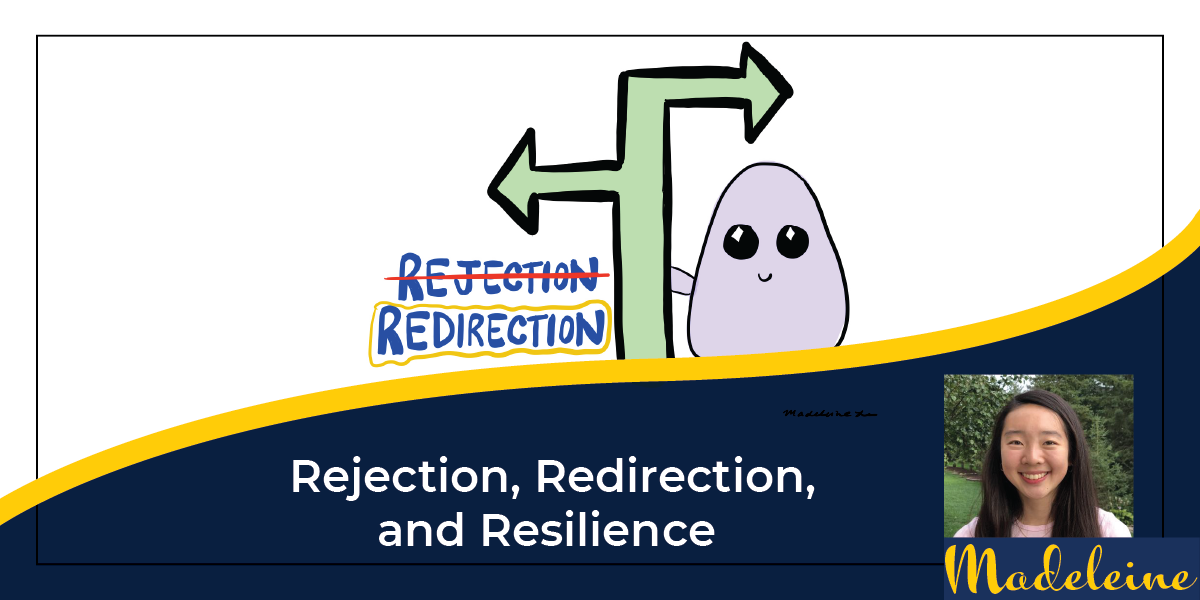Blog
Get the inside scoop about life at U-M and applying to Michigan from current student bloggers, Admissions staff, and guest faculty writers.

Get the inside scoop about life at U-M and applying to Michigan from current student bloggers, Admissions staff, and guest faculty writers.

Let’s be honest, rejection hurts, but it’s what we do with this redirection that matters.

A rejection did not reflect who I was. Rejection is redirection. I wanted to take what I had learned from this experience to prepare myself for the next one, whatever that may be.
With the end of the school year in sight and summer break right around the corner, spring is an exciting season. This long and certainly different school year is one for the books, and we can now look ahead to the next chapter of our lives. This time of year is also a time of decisions. Whether it’s making decisions or receiving decisions, it can be a stressful time for students.
Like many students, I submitted applications for various opportunities in hopes of solidifying my summer plans. After sending in my applications, I had mixed feelings of optimism and apprehension as I awaited these decisions. When was I going to hear back? What will the email say? Why am I nervous? These kinds of questions swamped my mind in anticipation of a red circle enclosing a white number appearing at the corner of my email icon, signifying that an email had been delivered to my inbox.
I didn’t know the answers to these questions, as most of them depended on the decision results themselves. However, I did know the answer to my last question: Why am I nervous? I was nervous because I wanted this opportunity greatly. At the time, it felt like this decision would be the be-all and end-all of my future path. If I didn’t get this, what did this mean for me? What would I do? My feelings of impatience, nervousness, and decision fatigue developed an internal feedback loop in which one thought just fueled the next into my thinking that everything rested on these decisions. In hindsight, I look back at myself and chuckle at how dramatic I was being at the time. Everything seems different in the moment versus once you have gone through something. This was a perfect example of that.
After what felt like eons of time, I finally started hearing back from the organizations I applied to.
“Dear Madeleine,
We are sorry to inform you that…”
“Hello,
Thank you for your interest in this opportunity. We appreciate the time you took to apply. Unfortunately…”
These days, you can already determine what a decision is after reading the first few lines, even first words, of an email. When I was given thanks for my application or spotted words like “sorry” and “unfortunately,” I already knew what the rest of the message entailed. I had received a rejection. And not just one but multiple.
Rejection hurts. I was disappointed and, in instances where I was more confident about my application, confused when I received news that I wasn’t accepted to a program or didn’t land the internship that I wanted. While the moment I had received my decision was difficult to bear, it was the post-rejection feelings that I found to be most detrimental. I started to fall into a downward spiral of self-doubt. I didn’t feel good enough, and it didn’t help when I saw others who were at the receiving end of good news and congratulations. Why didn’t I succeed? How come everyone else is thriving, but I’m not? This negative self-talk was not helping me in the slightest. It was only making me feel worse.
That’s when I decided to make the switch. I wanted to change the way I was thinking about rejection to help me move forward. To do this, I spent time talking and writing about rejection, as well as acknowledging and reflecting on it.
Rather than keeping my thoughts to myself, I found it incredibly helpful to share how I was feeling with loved ones. Initially, it was difficult to open up about this because I felt like I was giving my feelings of disappointment and anger all the more power by speaking them into existence. I thought I was giving these feelings unwarranted attention. However, this was wrong of me to believe. This attention was warranted. By talking about rejection, I was embracing my emotions and the unease I was experiencing. During conversations, I felt like my feelings were validated, and I was better able to put this experience into perspective, which supported me in taking the first step to acknowledging my disappointment.
I’m trying to get in the habit of journaling more because when I write, it is immensely beneficial in providing an outlet to release everything that I have been carrying with me. Like talking, it is another way for me to express what I am feeling and to come to terms with these emotions. I feel much lighter once I have jotted down my thoughts because I no longer need to circulate them through my mind. After putting pen to paper, I won’t forget my thoughts, but I can finally leave them on the page and move on.
Talking and writing have been valuable tools for acknowledging the feelings that follow rejection and moving away from negative self-talk. I realized that brushing off the disappointment didn’t work for me. I owed it to myself to acknowledge my discontent and to use that time to take care of myself. I deserved to treat myself to watching my favorite TV show, aimlessly perusing Spotify playlist recommendations, grabbing dinner with friends, and taking extra time to go through my skincare routine. It was beginning to feel like it was time to move on.
Last but not least, reflection. Talking, writing, and acknowledging my losses prepared me for this moment. A rejection did not reflect who I was. Rejection is redirection. I wanted to take what I had learned from this experience to prepare myself for the next one, whatever that may be. Going back to my journal, I asked myself: What went well? What could I have done differently? I had to be honest with myself and reflect on how I prepared for the application or interview and what I felt during and after the experience. Was it my best? If it was, can I seek out feedback from others? If it wasn’t, what can I do next time to better prepare myself? While improvement was my goal, a throughline during this stage of reflection was the thought that these experiences will only help me move forward, never move backwards. I tried, and that’s what mattered. I wanted to keep putting myself out there to help me move forward. I had everything to gain and nothing to lose.
Everyone deals with rejection differently so my experiences may differ from yours, which is completely normal and even expected. Let’s be honest, rejection hurts, but it’s what we do with this redirection that matters. On this track towards a better and more experienced self, we must continue to celebrate our wins, redirections, and growing resilience. Don’t let one “no” discourage you from putting yourself out there. The next time you don’t receive the result you want, just remember: “Yes, a redirection. My resilience is growing.”

Madeleine Lee is a senior in the College of Literature, Science, and the Arts with plans to work at the intersection of health and social justice. Outside of the classroom, she conducts research at the Kellogg Eye Center and is a member of the Korean-American Scientists and Engineers Association. She is an Ann Arbor native, and in her free time, you can find her running, solving crossword puzzles, or making playlists.